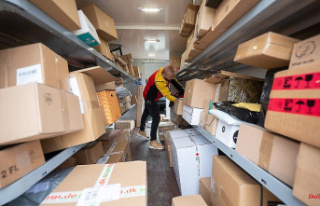Many Germans look forward to their Christmas goose, but could be disappointed this year. Because of the bird flu, large parts of the animals, especially imported ones, have to be culled. Almost every second plate could remain empty. And if you get a goose, you have to dig deeper into your wallet.
Poultry farmers fear that many people will have to do without the traditional Christmas goose at Christmas because of the bird flu that is circulating. "Never before has the goose been in such danger as it is now," said Lorenz Eskildsen, chairman of the Federal Association of Peasant Goose Husbandry. In recent months, colleagues in Germany, Poland and Hungary have lost significant parts of their stocks due to bird flu. This not only endangers the goose leg on the German plate, but also the existence of many companies.
According to Eskildsen, around 80 percent of the geese come to Germany every year as imported goods from Poland and Hungary. The remaining 20 percent of the animals grew up in Germany and were slaughtered there. The Polish main veterinary office said that so far the bird flu had only been recorded in two goose farms this year. This will probably have no impact on the market. However, the slaughter season will only begin in three weeks.
Eskildsen said that since many stocks have died or been killed as a precaution in the course of the bird flu wave, the prices for geese have also risen significantly. While buyers paid around 4.50 euros for a kilogram of a goose raised and slaughtered abroad last year, they would have to pay twice as much this year. With a German goose, the price jump is smaller: "Last year it was 15.95 euros per kilo, this year it's three euros more," said Eskildsen. In his company in Wermsdorf, Saxony alone, he breeds and slaughters around 30,000 animals a year, which then end up on the plate around Christmas Eve, said the association chairman. Fortunately, he has not yet been affected by bird flu.
Bottlenecks at Christmas are not only threatened with the Christmas goose. Poultry farmers in Great Britain fear for their turkeys, which are particularly popular at Christmas time. An outbreak at a farm could mean production had to be suspended for up to 12 months, the National Farmers Union said recently. More than three million birds have already been killed as a result of outbreaks in the UK this year. In France, on the other hand, there is a shortage of foie gras, a Christmas delicacy that is extremely popular there. The goose liver association said in September that the supply would be up to 40 percent lower. In addition, consumers would have to expect significantly higher prices.
For foie gras, ducks and geese have feed pumped through their necks with a metal tube - animal rights activists have therefore been protesting against the production for years. According to the EU health authority ECDC, Europe is experiencing the worst bird flu epidemic ever recorded. The geographical extent is also unique and stretches from Svalbard to Portugal and Ukraine, the authority announced at the beginning of the month.
Timm Harder, head of the National Reference Laboratory for Avian Influenza at the Friedrich Loeffler Institute (FLI), recently explained that the outbreaks in earlier years were mainly seasonal due to bird migration, but now they occur all year round. All of North America is also affected. One could speak of a real pandemic in wild birds. For the North Sea alone, it can therefore be assumed that tens of thousands of birds fell victim to the virus this year.
According to Harder, the virus that is currently circulating is rather harmless to humans. He is only aware of two infections in humans: one from England and one from the USA, both without serious illness.












